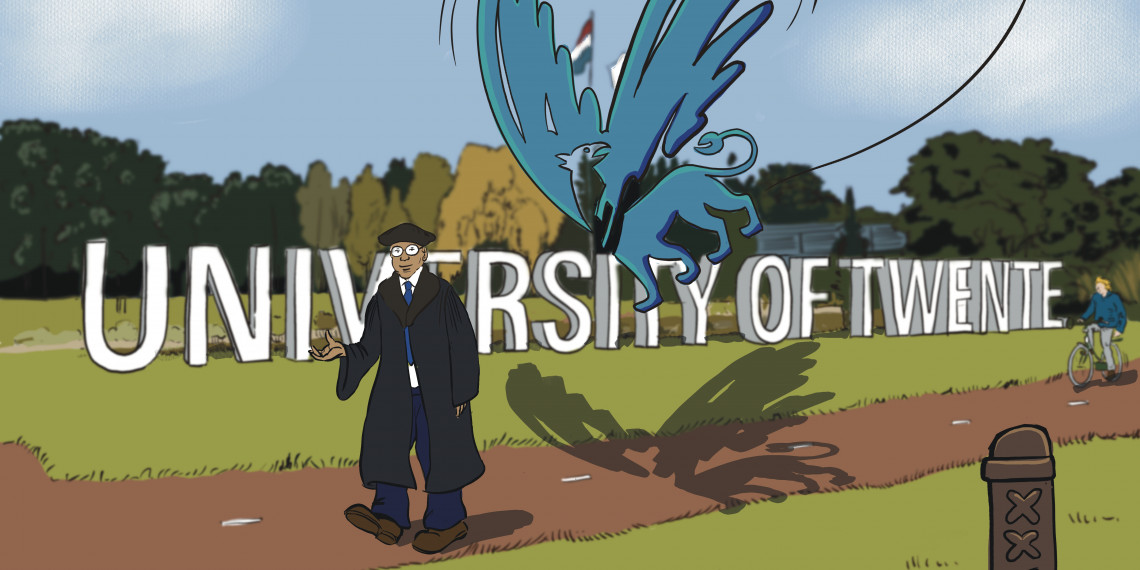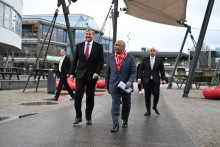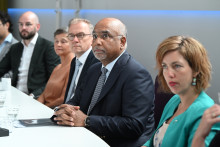As with any love story, there is always the initial flirt; a gentle spark that develops into a crackling bonfire. And the story is no different for the UT and VU. The Twente and Amsterdam-based universities formed a connection in 2017, when they, together with the UvA, were preparing a bid to become the home of the Netherlands Institute for Space Research (SRON). Their efforts were in vain as the space institute went to Delft and Leiden. The Twente-Amsterdam love story, however, continued to grow.
This is confirmed by Vinod Subramaniam, current president of the University of Twente and, at that time, rector of the Vrije Universiteit. ‘During the process, we got to know one another better and realised that we not only collaborated really well, but that we also had ideas for expanding this collaboration.’ This comes from a shared philosophy, according to Subramaniam. ‘Both of us are completely certain that collaboration is vital in order to take on the enormous social challenges ahead. The issues we are facing in areas such as climate change, digitalisation and future-proofing healthcare cannot be tackled with technicians alone. That is why we found a mutual interest in seeking combinations between the technical, social and behavioural sciences. We must seek the boundaries of disciplines; that is where the most interesting things happen.’
Technical talent
These are big words from the president. But he also realises that Rome wasn't built in a day. Starting off small was the motto for the UT and VU; don't run before you can walk. In September 2019, this resulted in the start of a joint programme in Mechanical Engineering, under the banner of the existing Mechanical Engineering programme at the UT. A completely new programme would entail much more consideration and preparatory work. This gave the collective ambitions of the UT and VU a flying start. Both organisations also recognised a gap in the market, explains Pieter Roos, the location director up until last summer. ‘A relatively low percentage of students from the Amsterdam region chose an academic engineering programme. Even the Mechanical Engineering programme in Delft was not popular. With this joint programme, we saw an opportunity to attract students and educate them. After all, the labour market is crying out for technical talent. The idea was that some of the students would also go on to do a Master’s programme in Twente once they had become acquainted with the UT. As a result, we can increase the number of students choosing to take a Master's programme and attract technical talent to the Twente region.’
‘I had a class at the VU and then had to be at the UT twenty minutes later’
School trip
A unique format was thus created. Anyone who opts for the Twente/Amsterdam programme in Mechanical Engineering attends lectures in both Amsterdam and Enschede. On the days that students come to the UT campus, they can stay in the log cabins at Boerderij Bosch. And does that work? Bo De Boer and Daan de Jong can tell best, as they were part of the first cohort. ‘It's great fun!’ says De Boer. The Amsterdam-born student is lyrical about the group’s overnight stays. ‘The first time we came to Twente, we immediately formed a friend group. It felt as if we were going on a field trip together. In all honesty, we didn't do much studying in the evenings, with the Vestingbar just around the corner. The fridge in the ‘Stall’, or the shed as we call it, was always full. I don’t think the teacher that we had on a Friday morning was particularly delighted about that though!’

And the travelling? Was the travel time and distance acceptable? According to De Jong, who lives in Heerhugowaard, it helped that the group quickly became close. ‘You have to travel for about three hours and that’s not everyone’s cup of tea. But the train connection is great and relatively quick. We often caught the international train from Amsterdam Central, where we gathered as a group. If we had no deadlines, we would often pass the time playing cards together. When there were deadlines, everyone would sit with a laptop in front of them. Then, before we knew it, we’d arrived in Twente.’
This type of adventure does not suit all students; a brand new programme at two separate universities. Why did they choose Mechanical Engineering? ‘After secondary school, I knew I wanted to do something technical,’ explains De Jong. ‘I thought Mechanical Engineering would be a good option, but there were no opportunities in the Amsterdam region. But that's where I live and where my friends are. Then I heard about this joint Bachelor.’ De Boer, in her own words, fell in love with Twente during an Open Day. ‘Its small scale really appealed to me. But I was 18 and not ready to live on my own. I was born and raised in Amsterdam. This is my city. In the end, the choice of Mechanical Engineering was a complete gamble and more than one person told me I must be mad. But it is a gamble that has definitely paid off. It's a great foundational programme.’
‘In some senses, this type of new programme is a sort of playground’
Experiment
For the first batch of students, teachers and other stakeholders, the first few years of the collaboration involve a great deal of pioneering work. 'In some senses, this type of new programme is a sort of playground', says Roos. ‘It is on a smaller scale. So, you have an opportunity to colour outside the lines and discover things that could be valuable at a later date elsewhere in the UT.’ Students De Boer and De Jong were also pioneers in the first years of the programme. And things didn't always run smoothly. ‘Sometimes things went wrong with the timetable as a result of the different systems at VU and the UT. I had a class at VU and then had to be at the UT twenty minutes later, for example. In Amsterdam, I also missed the option to walk in and chat to the teachers, which is completely normal in Twente. That's when you are reminded that you are studying at two different universities. We were right to call ourselves guinea pigs. But there are plenty of perks that come along with a new programme, including the fact that everyone took our opinions seriously when we provided feedback and that we could start new things, such as our own study association. And it is clear that the collaboration between the two universities is gradually improving.’
Differences and similarities
Nevertheless, the distinct differences between the two institutions and their students remain clear. ‘On the Twente campus, you can see who comes from Amsterdam just by their appearance and behaviour,’ De Boer says with a chuckle. The male/female ratio is also different, adds De Jong. ‘At VU, the population is more diverse.’ Location director at the time, Roos, also sees differences, primarily in relation to organisation but also in terms of culture. ‘If you look from a distance, there are enormous similarities. But the closer you zoom in, the more you have to focus on the practical and operational differences. Take, for example, the scale of the two institutions; the UT is quite flat while VU is bigger and more traditional.’ University president Subramaniam, who knows both institutions extremely well, can also see differences. ‘To put it bluntly, engineers just want to roll their sleeves up and get to work but in Amsterdam they sometimes feel the need for more discussion. But I find it even more impressive that we are able to bridge the differences and join hands. I see shared enthusiasm across the board.’
Enriching
That is precisely why the two universities have recently taken a second step in this collaboration, as Twente’s Bachelor programme in Creative Technology (CreaTe) will be offered by VU from September 2023. CreaTe in Amsterdam will be targeted at students from across the western Randstad region, according to programme director Alma Schaafstal. She says the programme in Amsterdam will be slightly different to the programme in Twente. ‘Even if it's only because we fall under the Faculty of Humanities. This is also reflected in the curriculum for the Twente programme. We thought long and hard to figure out: what’s in it for us? Why would we enter into this type of collaboration? I already understood it on a higher, more strategic level. And I am now convinced that on an operational level the collaboration will serve to enrich all the things we do here too. Take the new joint track Humane by Design, for example. I think that the collaboration will have a positive influence on the vibe of the Twente-based programme. This allows us to seek out and create added value for one another.’
According to Schaafstal, there are huge opportunities for Twente in terms of diversity. ‘I find the VU to be much more diverse than the population at the UT. This diverse and inclusive character is something that thrives within CreaTe.' And there are other things that the programme director is looking forward to. ‘Lectures will primarily take place in Amsterdam but for the major, interesting projects, we will let the students come to Twente. I am really looking forward to that: 250 students from both universities claiming the whole DesignLab and working together. I am super excited to facilitate that.’
‘I see shared enthusiasm across the board’
Future
Let's be clear: Schaafstal is delighted to be involved in the future collaboration. How does the departing location director Roos see the coming years for Mechanical Engineering? He believes that the joint programme should find a 'steady state’. ‘It’s all about realising a stable condition after this start-up phase, and that has been hindered somewhat by Covid-19. You can’t be pioneers forever. The big challenge is to make the circle of commitment stronger and larger. In order to achieve this steady state and ensure robust commitment, an even share of teachers from both VU and the UT is vital. The balance is currently a little tilted towards the UT side. It is also important to create a base for this programme within the Faculty of Science at the VU, which also connects to the VU’s research. Then we will have a better position within the faculty.’
And how about the future of the first cohort of Mechanical Engineering students? They graduated last summer. Have they chosen a master’s programme in Twente? The score is 100%: both are choosing Twente. ‘When I said this, I was enthusiastically told, "Woohoo, we've managed to reel one in!" It was a very deliberate choice to come to Twente,’ says De Boer. ‘In Amsterdam, there is not a really suitable postgraduate programme for me, even though there are a lot of attractive companies. I may well end up going back to Amsterdam for one of these companies.’ De Jong also chose Twente – after some initial doubt between a master’s in Twente or Delft. Above all, he is glad he completed the joint programme. ‘As a student from the Amsterdam region, you don't have to move into student room at a young age but you can still do a technical programme. There is a high demand for this from society.’
While the first students have collected their diplomas and the Mechanical Engineering programme is trying to realise a ‘steady state’, the next collaboration is already in the pipeline. As well as CreaTe, both institutions are exploring a joint programme in Industrial Engineering & Management. University president Subramaniam sees the graduation of the first students as a genuine milestone. ‘Alongside Mechanical Engineering and CreaTe, we should work on a brand new joint programme in the long term. The collaboration must also lead to strong research proposals, both national and European. In the end, we want to achieve positive, shared interdependence. That is our goal.’
Illustrations by Enith Vlooswijk







